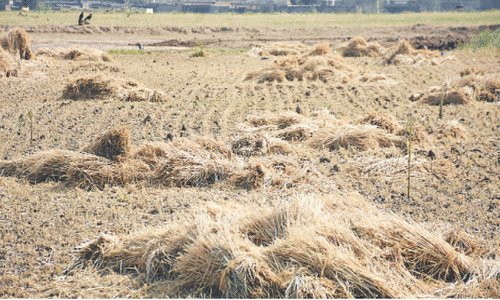ISLAMABAD: Mohammad Naeem, 25 and a resident of Quaidabad, near Khushab, had to come all the way to the Allergy Centre in the National Institute of Health (NIH), Islamabad because he was experiencing allergy symptoms.
It is not that he could not find an allergy centre in Quaidabad and nearby areas and came directly to Islamabad to have himself checked.
“I went to a number of clinics and hospitals and though they did provide me with medicines, the symptoms did not go away. My business was suffering because I am a motorbike mechanic and cannot work with full attention when I have allergies,” Mr Naeem told Dawn.
He said none of the clinics he visited could tell him what he was allergic to and that a medical practitioner then advised him to go to the NIH to diagnose his allergy.
“I have two children, a three-year-old son and a one-year-old daughter, and I have to be able to provide for them. I need proper treatment and I hope they are able to find out what I am allergic to,” he said
A large number of patients can be seen waiting inside and outside the NIH building and in long queues outside the service windows for men and women.
An overseas Pakistani who is visiting, Mohammad Farooq was also at the institute, hoping to find out what he was allergic to.
“I did not know I had an allergy till last year when I ate some kiwi fruit and my face started swelling. I felt like I had needles all over. I was taken to the hospital and was given some anti-allergy medicines,” he said.
“A few weeks later, I was going to Paris and was offered some fruit cocktail. I had only just had some when my tongue and face started swelling and it became difficult for me to talk. I was given some medicines again and the symptoms went. I experienced a rash again a few days ago after I had some dry fruit,” he said.
Mr Farooq said he decided to visit NIH so he can get a proper diagnosis and treatment for the problem.
Acting in-charge Allergy Centre Dr Shahab Qazi told Dawn that the centre was established in the late 80s and that initially, the centre was comprised of just a room with around 50 patients visiting daily.

“Allergies increased over time as did awareness about allergies. We now get between 800 and 1,000 patients a day with most complaining of pollen allergies and chest infections due to paper mulberry, food allergies including that of wheat, asthma and some people have psychological problems due to which they experience allergy symptoms in the spring,” he said.
“We do conduct tests but I suggest people try to find out what they are allergic to. Patients themselves can better pinpoint what they are allergic to. However, there is a lack of awareness due to which people insist we should find the reason. We can only conduct a skin prick test and collect history,” he said.
Dr Qazi said there are nine doctors and five nurses at the centre other than the overall 40 members of staff.
“We get patients from across the country. During the summers, people will come as early as 4am so they can be looked at first. State-of-the-art allergy centres should be established in the country so that the burden on this centre is shared,” he said.
Patients are charges Rs550 as fee for the first visit along with Rs500 for a vaccine and they have to pay Rs2,500 over three months to diagnose their allergies, Dr Qazi said.
However, treatment can last up to three years and some patients are able to get rid of their allergies completely.
“We earned over Rs162 million in 2017-18 but we still lack many facilities including chairs, heaters and shade for waiting patients. I hope that the new National Health Services minister will address our issues,” he said.
University of Health Sciences Vice Chancellor Prof Javed Akram told Dawn that an allergy is hyper activity against external elements in the body.
“Dust and cold air may not affect the majority of people but just some may find it to be a reason for inflammation in the body. People have rashes, asthma and a number of other problems. Whenever an allergen such as pollen enters the body, the body starts making mast cells or antibodies which later start bursting, which is what causes inflammation. Allergies differ from person to person so that everyone is affected by allergens to varying extents,” he explained.
Dr Akram said diagnosing allergies through tests is only possible in some cases, especially in younger patients.
“I suggest people try to identify the reason for their allergy and avoid things they may be allergic to such as milk, fish, eggs,” he added.
Published in Dawn, December 16th, 2018














































